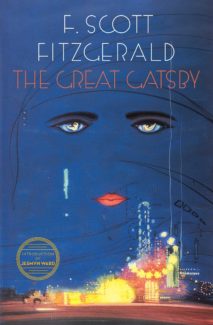 T.J. Eckleburg and the Great American Icarus
T.J. Eckleburg and the Great American Icarus
Author: F. Scott Fitzgerald
As many of you know, my book obsession cannot be satiated, nor can a project I started several years ago ever truly be finished: an attempt to read through all of the “missed” classics – those books you should have read and have endlessly heard about yet somehow were never assigned in school. Partially going off a random eBay list, and partially off recommendations, I’ve made some steady progress and discovered some jewels. What I didn’t expect, when coming to the well-known and universally touted Great Gatsby, was that I would soon find a new favorite.
A novel of disillusion in the Jazz age, the Great Gatsby is just as powerful today; rich vs poor, social classes and outcasts, love and selfishness, and the overall simulacrum of money and power equating to happiness and meaningful possession. It begins with enigmatic Gatsby, a self-made man who throws the most lavish, debauched, parties – inviting everyone who is anyone. The more the merrier. Only, Gatsby himself is the one reveler never seen at these bar-no-expenses shindigs. Enter our narrator, Nick Carraway, a temporary summer resident on the island of West Egg, next to the opulent Gatsby manor. Nick’s curiosity about this new sort of high life has him tagging along with his laconic brother-in-law Tom Buchanan, Tom’s suitably cynical friends, and Tom’s shrill mistress; Nick is neither given over to nor entirely repulsed by the idleness of a new life and while his judgement rolls under the surface, his own exterior fascination propels the story with a dry sort of detachment. As social mores are pushed aside, escapable through wealth, subterfuge, and the idea that everyone, after all, is doing it, Nick becomes a prime target for the absentee Gatsby who soon reveals that his modus operandi is to once again acquire the love of Nick’s cousin, Tom’s wife, the immaculate, pedigreed Daisy.
Gatsby originally met Daisy when he was a solider, long before the money and subsequent fame. Now, Gatsby has everything, has built an empire – some say through shady means, although Gatsby really remains an unknown – and it is all for Daisy. And that’s how an American love story, ostensibly built on the internalized valuing of worth, obsession with social standing, and the hazy, unreachable dreams of glowing attainment – the unfettered American dream, progresses from phantom delusion to desolate nightmare.
 Juxtaposed between a gut-punching, in-your-face moral about loyalty and what one can, and cannot buy, The Great Gatsby is beautiful in the promenade of its ugliness and the shifting of its facades. It’s not a story where you like the characters or even want them to succeed. They are indolent, spoiled, selfish in the cruel and careless way of bored children. They watch and narrate from the shadows and Gatsby’s obsession with being one of them is the more poignant for the fact that he can never succeed, can never break into that world and its rotting luxury. The moral is a common one – the lesson one we have all achingly learned – that friends and love can’t be bought or even pampered into affection. Money buys loyalty only until things start to fall apart – and they do, dramatically, tragically, brutally. Add a speeding car, a dissolving marriage on a stiflingly hot summer evening, an accidental murder, and lies and the speed of the story downshifts, the characters fleeing ant-like back to what they know and in actuality, never left. If Nick won’t, or can’t, judge them then we certainly can and although Gatsby is not the sort of character whom you love, the very trajectory of his fall and his attempts to thwart it and also “protect the prize” cause the readers a certain type of heartbreak, a certain sympathy for a man suffocating in a world where the happiness is a cheap, lacquered, and peeling substitute, barely hiding the unfeeling ugliness beneath.
Juxtaposed between a gut-punching, in-your-face moral about loyalty and what one can, and cannot buy, The Great Gatsby is beautiful in the promenade of its ugliness and the shifting of its facades. It’s not a story where you like the characters or even want them to succeed. They are indolent, spoiled, selfish in the cruel and careless way of bored children. They watch and narrate from the shadows and Gatsby’s obsession with being one of them is the more poignant for the fact that he can never succeed, can never break into that world and its rotting luxury. The moral is a common one – the lesson one we have all achingly learned – that friends and love can’t be bought or even pampered into affection. Money buys loyalty only until things start to fall apart – and they do, dramatically, tragically, brutally. Add a speeding car, a dissolving marriage on a stiflingly hot summer evening, an accidental murder, and lies and the speed of the story downshifts, the characters fleeing ant-like back to what they know and in actuality, never left. If Nick won’t, or can’t, judge them then we certainly can and although Gatsby is not the sort of character whom you love, the very trajectory of his fall and his attempts to thwart it and also “protect the prize” cause the readers a certain type of heartbreak, a certain sympathy for a man suffocating in a world where the happiness is a cheap, lacquered, and peeling substitute, barely hiding the unfeeling ugliness beneath.
As the story, short but succinct and gritty, progresses, Fitzgerald’s hypnotic writing style drags us into this surrealistic world from the planes of ash ruled by T.J. Eckleburg’s prescient billboard. Winding sentences capture the summer boredom of the young and wealthy and then transform with the narrator’s subtle connection between the dead landscape and the corruption of the idle rich. These swaying, long sentences are nevertheless controlled, secretly pointed and progressing the narrative to its deadly and unforgettable end.
The Great Gatsby remains a classic not because of its literary structure or even the nihilism of its looping words, but because of the fragile, bleeding heart of desperate humanity that it reveals. The destruction of longing and want. The fall from grace that comes from flying too high. The desperate fractures that belie a perfect world.
– Frances Carden
Follow my reviews on Twitter at: https://twitter.com/xombie_mistress
Follow my reviews on Facebook at: https://www.facebook.com/FrancesReviews/
[AMAZONPRODUCTS asin=”0743273567″]
- Book Vs Movie: The Shining - April 6, 2020
- Thankful For Great Cozy Mysteries - December 13, 2019
- Cozy Mysteries for a Perfect Fall - October 20, 2019

